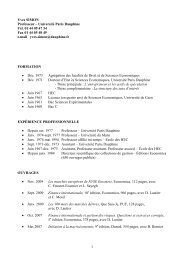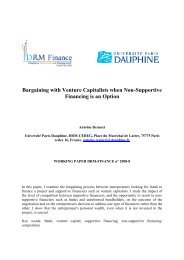Corporate governance and earnings management ... - CEREG
Corporate governance and earnings management ... - CEREG
Corporate governance and earnings management ... - CEREG
You also want an ePaper? Increase the reach of your titles
YUMPU automatically turns print PDFs into web optimized ePapers that Google loves.
1973 (Bensadon, 2002, p. 58). There was then at that time a conflict between the French<br />
“regulation” <strong>and</strong> the “desires” of groups.<br />
3.4. Phase 3: the dynamic phase<br />
3.4.1. United States: the dynamic position comes out on top (1970 - 2001)<br />
In a free competition economy, the accounting st<strong>and</strong>ards system is not generally in favor of<br />
pluralism: to regulate competition, the st<strong>and</strong>ards must have the dominant interests at heart.<br />
This does not mean matters are always simple.<br />
In the 1940s, three main phenomena were visible on the American scenery: the doctrine <strong>and</strong><br />
practice of writing off goodwill was in decline, the dynamic doctrine <strong>and</strong> practice began to<br />
take over, <strong>and</strong> there was still some resistance to doctrines <strong>and</strong> practices that wanted goodwill<br />
to have no impact on profit.<br />
a) The decline of the write-off<br />
The decline of the write-off approach can be observed in the theory, regulations <strong>and</strong><br />
practice. This calls for some explanation. In the doctrine, the decline is clear, at least from<br />
around 1945-1970. The leading author of accounting literature at the time was the renowned<br />
Paton (1962), who like other authors such as Walker (1953), Kripke (1961), Hylton (1964;<br />
1966) <strong>and</strong> Wolff (1967, p. 258), was in favor of dynamic approaches <strong>and</strong> against goodwill<br />
write-off. His opponents were only minor authors, often practitioners such as Catlett <strong>and</strong><br />
Olson (1968), <strong>and</strong> Spacek (1973), who found themselves in the minority in discussion<br />
committees on the development of accounting st<strong>and</strong>ards.<br />
The decline in the regulations is just as obvious. In 1948, the American Accounting<br />
Association (AAA) decided that “adherence to the cost basis of accounting requires that there<br />
should be no suppression or unwarranted assignment to expense of the cost of existing assets”<br />
(AAA, 1948, p. 340). Although not stated explicitly, this was aimed at “arbitrary” write-offs,<br />
particularly charging to reserves.<br />
42



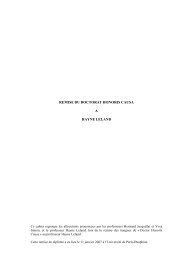
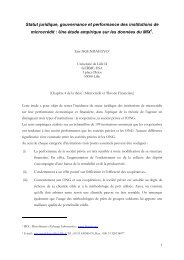
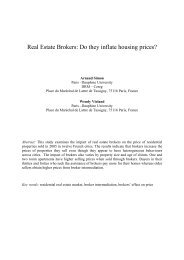
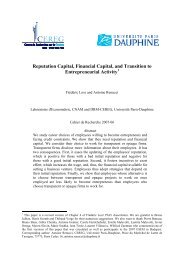
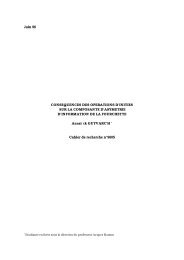
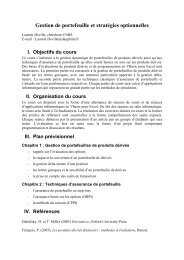
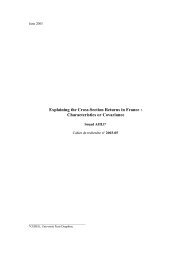
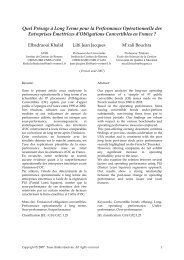

![& 6 ] ^ F ]^ - CEREG - Université Paris-Dauphine](https://img.yumpu.com/33326502/1/184x260/-6-f-cereg-universitac-paris-dauphine.jpg?quality=85)

